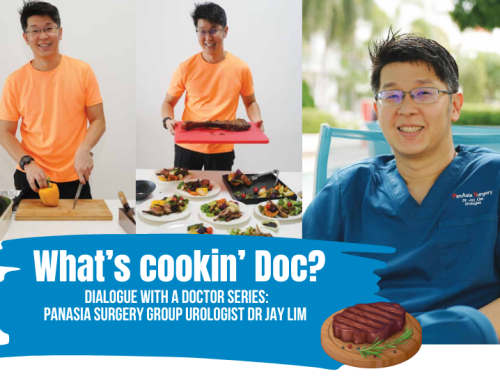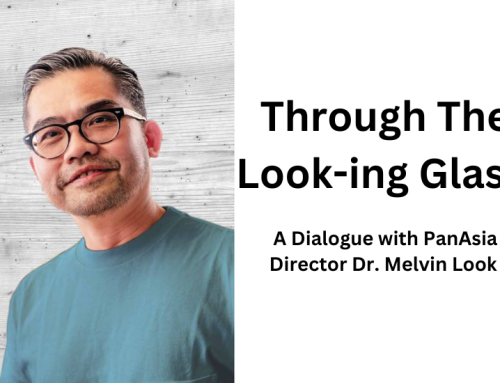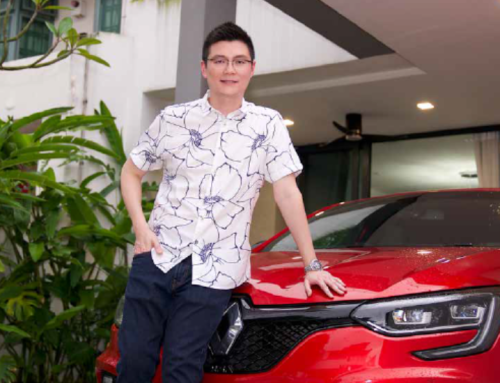Dialogue with A Doctor: B9 Dental Centre, Founder Dr Raymond Lim

In the US, it is estimated that nearly 75% of adults experience some amount of fear with regards to visiting a dentist. Of that percentage, about 5-10% have a strong enough fear to be considered sufferers of dental phobia. These individuals experience fear so strongly that they avoid dental visits, which can be highly detrimental to their dental health. Dental phobia can be caused by many reasons. One possible reason may be prior bad interactions with a dentist. If an individual received care from a dentist who was uncaring or cold in manner, the experience could result in an unreasonable fear. However, one is unlikely to ever encounter such experiences with Dr Raymond Lim.
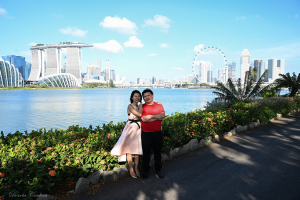 Widely known for his warm, gentle and caring nature, Dr Raymond Lim founded and runs the highly successful chain of B9 Dental Centres. With his expert professional skills and affable demeanor, Dr Lim has built up a large and loyal following of customers who swear by his unerring wizardry in solving their dental issues – with a kind and reassuring touch. Yet, Dr Lim’s concerns for his patients go far beyond their dental problems. He also often shows great concern for their health and well-being.
Widely known for his warm, gentle and caring nature, Dr Raymond Lim founded and runs the highly successful chain of B9 Dental Centres. With his expert professional skills and affable demeanor, Dr Lim has built up a large and loyal following of customers who swear by his unerring wizardry in solving their dental issues – with a kind and reassuring touch. Yet, Dr Lim’s concerns for his patients go far beyond their dental problems. He also often shows great concern for their health and well-being.
In this edition of Prime Interview Series’ Dialogue with a Doctor Interview, we have the pleasure of speaking with Dr Lim, who shares with us his thoughts and personal experiences on health and well-being.
Thank you, Dr Lim, for taking precious time from your busy schedule to speak with us. We greatly appreciate it! As you know, this series of interviews is about health and wellness. So first off, what are your general thoughts on these matters and what influenced your thinking?
DR RAYMOND LIM: Thank you. It is a pleasure for me as well. To me, health is focused on both physical and mental aspects. It is a goal that we work hard to achieve as we aim to be free from illness, injury or disease. Wellness, on the other hand, is about being more than just free from illnesses. It involves a spirited process of change and growth that lasts for a lifetime. Wellness addresses the broader spectrum of your body, encompassing the overall balance of your physical, mental and spiritual well-being. It speaks to the way you live your everyday life.
Let me give you a personal example. My father used to suffer from gout and obesity when I was about 12 years old. Because of that, my mother determined to make his daily meals healthier. She changed to cooking brown rice and more vegetables, while encouraging him to eat more fruits. She also ensured that he ate less oily food and less meat by spending more time cooking for the family. This change in diet had a profound effect on us. It led to us being more health conscious as we witnessed the effects on our father first hand.
My father recovered from his gout fully, without taking any medication. He was diligent in exercising twice a day doing exercises such as taiji and jogging. I was very impressed by my father’s determination to do the right healthful thing. In fact, he has been doing this for the past 30 years. He has continued to do the same exercises twice daily and consume the same healthy meals every day without fail, despite his recovery. His persistence deeply influenced my beliefs and my way of living.
That’s impressive! How have your father’s example influenced your lifestyle? Are there any difficulties in balancing between these healthful beliefs and the demands of work?
RL: I try my best to adhere to a healthy lifestyle. I do not think that it is easy sticking to a healthy regime, nor do I believe it ought to be. It takes a healthy amount of determination and discipline to ensure that you always do the right thing for your health. The fact is I do spend most of my time in my clinic. I spend a lot of time working, often until early morning 6am. Despite that, my assistants help to ensure that I take proper and healthy meals regularly. They will arrange for us to have regular meal times during work, even though we are busy practically every day. I would try to take as much vegetables and fruits as I can for my lunch and dinner. At the same time, I have actually tried to go on diet a few times. I have found it to be effective in reducing weight, which contributes to me being more alert and having more energy at work.
Ultimately, on the subject of balancing between health and work, being busy at work is a fundamental part of my lifestyle. I feel I experience the fullness of life when I am immersed in my work. It is part of my life’s key responsibilities, which includes my family. It keeps me happy. But while I spend my workdays immersed in my work, I spend my weekends with my family. They keep me happy as well. That is part of healthy living. After all, as I mentioned, health and well-being goes beyond the physical, there is also the mental and spiritual parts of the equation.
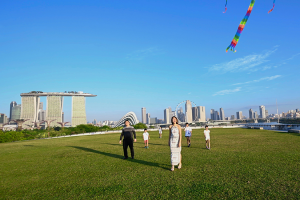 Speaking about your family, you have a large family, with a number of kids. Following your father’s example, do you try to encourage and ensure that your family eats healthy too?
Speaking about your family, you have a large family, with a number of kids. Following your father’s example, do you try to encourage and ensure that your family eats healthy too?
RL: Just as my parents took care of me when I was young, now is my turn to take care of my family. Similar to what my mother did for my father and us, I also get my children to have more fruits and vegetables, while consuming less oily food and meat. The good thing is every member of my family enjoys eating healthy food. We are also encouraging to each other, making sure that we all eat and live healthily. However, kids being kids, sometimes they do need a nudge here and there to keep up their good eating habits. Hence, I always share with them how recovery patients staying in hospitals become healthier due to their healthy diet. This encourages them to eat healthier.
My father’s example went beyond just diet though. He is also disciplined in his commitment to physical activities. Likewise, we have continued in this tradition of engaging in healthful activities for the family. Personally, I was once my school’s representative for handball and badminton. I also used to enjoy jogging and going to gym every day. While I do not do these on my own anymore, I do try to have regular family activities with my wife and kids, which includes doing physical activities together. Just recently, we went out to ride bicycles together. We also spent some family bonding time at the beach. These activities help to build up our family, allowing us to better understand and love one other. Furthermore, we also get to keep ourselves healthy as we take part in these physical exercises.
Let’s go back to the subject of work. As you mentioned, it is a big part of who you are. You run a chain of clinics, which must take up a lot of time and energy. Do you find yourself getting adequate rest? And how do you manage stress?
RL: I started B9 in 2013 with just one clinic. Today, B9 has 6 clinics at various locations across the island. It was not easy. This growth was built upon the foundations of very hard work. Very often, I have had to work until 6am every morning, dealing with administrative matters. After finishing these tasks, I will then sleep in the morning for about 5-6 hours before starting work again. For myself, I am able to function with this amount of rest. This may not be adequate or recommended for everyone.
I think that for most of us as working adults, and as fathers, mothers and children of our own parents, we are constantly facing stress every day. It is very much a part of daily life for most people. I am possibly more task-oriented in this respect. To counter or reduce the stresses that I face, whether in work or in other areas, I simply find the solutions to the problems that I am facing. I think we need to build up resilience when it comes to pressure. Face the problem and find the solutions. Do not run and do not fold. That, to me, is the best way to deal with stress.
However, if you do need support when it comes to managing stress or when you encounter huge problems, do not avoid seeking help either. Finding support is, in itself, a very viable way to manage stress. For myself, I am in the privileged position of being about to discuss my problems with my family members. This gives me an extra outlet to deal with stress. And it works both ways. They will listen to me talk and I will do so likewise for them. I will try to understand about my children’s needs and anxieties, especially in school. Where necessary, I will approach and discuss with their teachers about the problems my children are facing and try to come up with the solutions together. I think that, as adults, we need to look beyond ourselves. We need to find out and understand about the pressures our children are facing, and help them deal and better cope with their stress.
 That sounds like a good piece of advice for people with children at school-age. Do you have any advice for busy individuals themselves on ways to maintain a healthy lifestyle?
That sounds like a good piece of advice for people with children at school-age. Do you have any advice for busy individuals themselves on ways to maintain a healthy lifestyle?
RL: Although I am often very busy myself, I think there are means and ways possible for busy professionals to lead a healthy lifestyle. We just need to allocate our time carefully to have time for activities like jogging, swimming or going to the gym. In Singapore, we should not have too much difficulty finding spaces to jog or finding places to work out. Nowadays, there are gyms conveniently located in many places across Singapore. They are practically everywhere, especially in the city area where many gyms have sprouted up to cater to working professionals. Even in the heartlands, there are many private gyms available, and our government has also made gyms and other sporting amenities easily accessible to everyone. So while time may still be something we lack, we really just need to make an effort to find time. Everything else is in place for us to succeed in keeping ourselves healthy.
In your line of work, what aspects of health do you often see your patients neglecting? Do you see any ways in which COVID-19 has affected the way people view and value their dental health?
RL: Generally, we have noticed many patients suffering from gum diseases due to poor oral hygiene. My primary role as a dentist is to ensure that my patients’ oral well-being is at the best satisfactory condition. Hence, when we see them having gum issues, we will always advise them to come back once every 6 months for a follow-up checkup.
It is interesting how you brought up COVID-19 and whether it has changed the way people view and value dental health. I have seen changes, but I am not sure whether this is a result of COVID-19. Patients still value their dental health, but their approach to it has changed. Personally, I have noticed that more patients prefer to do root canal treatments to save their teeth rather than have extractions. I think this change could be long term and is beyond the influence of COVID-19. With more sources of information available everywhere, people are simply becoming more aware of their own dental health. They are now savvier about what dental health is about and the options available to them. They have become better equipped to make informed choices.
We have come to the end of our interview. Thank you very much, Dr Lim. As a parting advice, can you give your top three life tips, in brief, to all our readers?
RL: Thank you for inviting me as well. My top three tips are very simple. Think positive. Love and care the people around us. And eat more vegetables and fruits, with less salty and oily food to prolong your life!







